
For the last two centuries, literature has tested the authority of the individual and the community. During this time, in David Bromwich’s words, “A motive for great writing…has been a tension, which is felt to be unresolvable, between the claims of social obligation and of personal autonomy. That these had to be experienced as rival claims was the discovery of Burke and Wordsworth. Our lives today and our choices are made in a culture where any settlement of the contest for either side is bound to be provisional. There is nothing to approve or regret in such a situation; it is the way things are; and in a time like ours, it is what great writing lives on.”
With a historical as well as an interpretative emphasis, Bromwich explores this tension. He shows why the public-mindedness of the eighteenth century is as limited a model for readers now as the individualism of the nineteenth century. Calling attention to the ambivalence of the great writers, he cites Emerson’s sense of the conflict between “spirit” and “commodity” and Burke’s conviction that human nature is at once given and chosen. Elsewhere, he describes the attenuation of social concern even in the truest modern followers of the romantics as in the conscious turn away from Wordsworth’s morality in poems by Stevens and Frost. Other topics include Keats’s politics, Whitman’s prose, William Cobbett’s journalism, and the standards of the Edinburgh Review.
In some widely discussed general essays, Bromwich addresses such issues as the uses of biography, the idea that authors create their own worlds, and the political ambitions of recent literary theory. His own criticism is powerfully eclectic, combining history, philosophy, biography, and a subtle awareness of how literature performs its work of implication. He brings to the task an authentic understanding of intellectual culture and the ability to leap from textual detail to cultural observation with an understated grace.
As in his other writing, Bromwich aims to join aesthetic theory and moral thought. He rethinks the relationship between genius and talent, and defines genius in terms of its capacity to bring about change, rather than simply its quality of inward and spiritual uniqueness. His sustained defense here of that conception, and his elegant argument for a new approach to criticism generally, make this thoughtful book a controversial one as well.

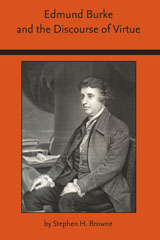
"A major accomplishment in the study of Burke." —Choice
More than 200 years after his death, Edmund Burke remains among the most influential conservative writers in the Anglophone world. Burke’s relevance has only grown as the nature of what it means to be a conservative has become hotly contested.
And yet Burke is often discussed more than he is read. Worse, his rhetoric is often pressed into the service of other ideologies. In Edmund Burke and the Discourse of Virtue, Stephen Browne of Pennsylvania State University subjects Burke’s work to the close textual analysis it has never received.
The result of Browne's study is to present Burke and his work in a light that was clearly essential to Burke himself, one that illuminates the link between rhetoric and action that is key to understanding Burke, his career, his work, and his influence on contemporary conservatism.
Readers interested in the development of conversative philosophy, politics, and writing from its earliest roots will value this rare and illuminating work.
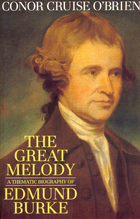
"In bringing Burke to our attention, Mr. O'Brien has brought back a lost treasure. The Great Melody is a brilliant work of narrative sweep and analytical depth. Conor Cruise O'Brien on Edmund Burke is a literary gift to political thought."—John Patrick Diggins, New York Times Book Review
"Serious readers of history are in for a treat: a book by the greatest living Irishman on the greatest Irishman who ever lived. . . . O'Brien's study is not merely a reconstruction of a fascinating man and period. It is also a tract for the times. . . . I cannot remember another time when I finished a book of more than 600 pages wishing it were longer."—Paul Johnson, The Independent
"The Great Melody combines superb biography and fascinating history with a profound understanding of political philosophy."—Former President Richard Nixon
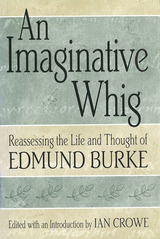
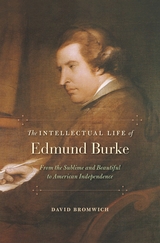
David Bromwich’s portrait of statesman Edmund Burke (1730–1797) is the first biography to attend to the complexity of Burke’s thought as it emerges in both the major writings and private correspondence. The public and private writings cannot be easily dissociated, nor should they be. For Burke—a thinker, writer, and politician—the principles of politics were merely those of morality enlarged. Bromwich reads Burke’s career as an imperfect attempt to organize an honorable life in the dense medium he knew politics to be.
This intellectual biography examines the first three decades of Burke’s professional life. His protest against the cruelties of English society and his criticism of all unchecked power laid the groundwork for his later attacks on abuses of government in India, Ireland, and France. Bromwich allows us to see the youthful skeptic, wary of a social contract based on “nature”; the theorist of love and fear in relation to “the sublime and beautiful”; the advocate of civil liberty, even in the face of civil disorder; the architect of economic reform; and the agitator for peace with America. However multiple and various Burke’s campaigns, a single-mindedness of commitment always drove him.
Burke is commonly seen as the father of modern conservatism. Bromwich reveals the matter to be far more subtle and interesting. Burke was a defender of the rights of disfranchised minorities and an opponent of militarism. His politics diverge from those of any modern party, but all parties would be wiser for acquaintance with his writing and thoughts.
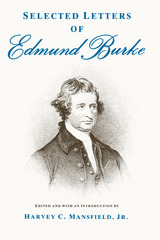
READERS
Browse our collection.
PUBLISHERS
See BiblioVault's publisher services.
STUDENT SERVICES
Files for college accessibility offices.
UChicago Accessibility Resources
home | accessibility | search | about | contact us
BiblioVault ® 2001 - 2024
The University of Chicago Press









